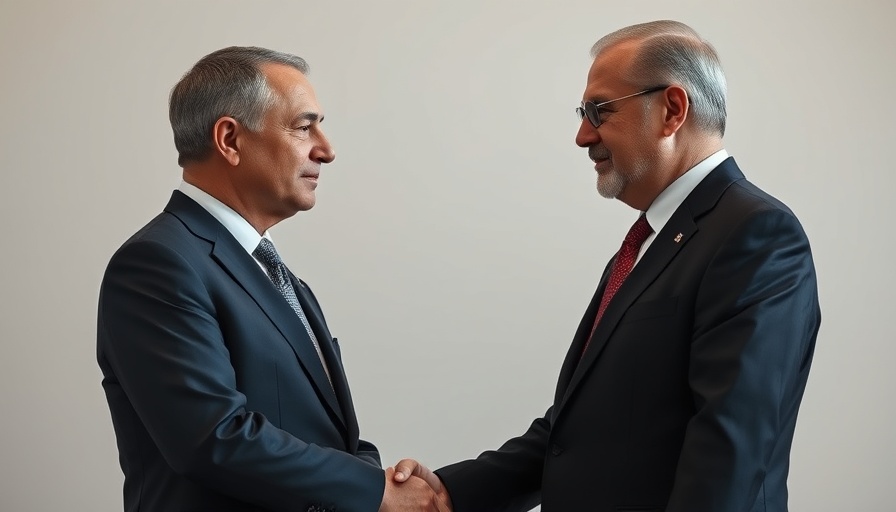
A New Era of Diplomacy: Trump's Meeting with Syrian Interim President
The recently reported meeting between U.S. President Donald Trump and the interim president of Syria, Ahmed al-Shar, marks a significant turning point in Middle Eastern diplomacy. This unprecedented engagement was orchestrated by Saudi Arabia and Turkey, countries that have played pivotal roles in the Syrian conflict over the last decade. As al-Shar extends his hand for a handshake with Trump, we witness a moment that only months ago seemed inconceivable. It illustrates a broader shift in the geopolitical landscape and underscores the evolving relationships within this war-torn region.
In 'Trump meets Syria's interim President Ahmad al-Sharaa in Saudi Arabia,' the discussion dives into diplomatic transformations in the Middle East, exploring key insights that sparked deeper analysis on our end.
Contextualizing Ahmed al-Shar’s Rise
Ahmed al-Shar’s trajectory from being a radical figurehead associated with Islamist entities previously labeled by Washington as terrorist organizations to a diplomatic leader seeking to reintegrate Syria into the global political landscape is astonishing. This transformation, coupled with the coalition he leads, reflects the complexities of Syria’s current moment—distraught yet yearning for redemption and international acknowledgment. Al-Shar's governance is framed against the backdrop of a devastating civil war, economic collapse, and the urgent need for reconstruction.
Implications of the U.S. Lifting Sanctions
In welcoming signs of potential normalization, Trump's statement indicating the impending end of crippling sanctions on Syria is consequential. This decision could catalyze much-needed financial recovery and investment in the beleaguered country. Al-Shar's administration is at a cusp where financial assistance could revive industry, agriculture, and vital infrastructure. How would this shift towards cooperation reshape regional dynamics? Scholars and practitioners of international relations need to pay close attention to this unfolding narrative.
Repercussions Across the Region
The implications of Trump and al-Shar's discussions extend beyond bilateral relations; they resonate throughout the region. The impact on Persian Gulf politics could surge, as other nations consider their stance on Syria and the potential return of a former pariah state to the Arab fold. This week has seen jubilant responses within Syria, where citizens express hope for economic revival and an end to years of isolation. Such sentiments reflect a thirst for stability and prosperity after 14 relentless years of civil strife.
Decoding the Public Sentiment in Syria
A crucial aspect of this entire narrative lies within the public sentiment in Syria itself. The struggles of ordinary citizens, who have endured the hardship of war and instability, provide a human context that is often overshadowed by political maneuvering. With cheering in the streets of cities where poverty reigns, the emotional narratives intertwined with the political shifts are essential for global observers to recognize. The juxtaposition of hope against a backdrop of despair presents a unique challenge to any prospective leader.
Expectations and Future Predictions
As we peer into the future, several forecasts emerge. Al-Shar’s leadership will likely face scrutiny as he navigates domestic expectations and international pressure. Will he fulfill the promises of economic rehabilitation and political stability? Or will old cycles of discord return? Critical observers suggest that the real challenge lies in sustainable governance against the backdrop of sectarian divides and lingering hostilities brought about by years of war.
The Broader Global Context
This meeting also carries significant implications on a global scale. How will the new climate of engagement with Syria influence broader U.S. foreign policy? The convergence of interests among regional players like Turkey and Saudi Arabia adds another layer of intrigue to the geopolitical puzzle. The evolving relationships among these powers could also redefine alliances and opposition factions in the future, further impacting the complex web of Middle Eastern politics.
In conclusion, this meeting is not merely a handshake between two leaders; it symbolizes potential healing for a nation torn apart by violence and serves as a reminder of how quickly geopolitical winds can shift. As the world watches, the interplay of domestic needs, international relations, and the war-torn Syrian landscape will require vigilant analysis and public discourse.
Staying informed about evolving global dynamics is crucial in an age where rapid changes dictate the future of nations. Consider following Africa News for more insights into these significant events impacting not just the Middle East, but global stability as we know it.
 Add Row
Add Row  Add
Add 




Write A Comment